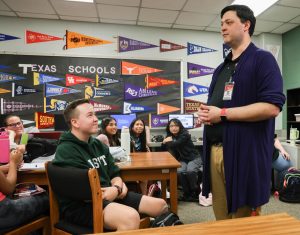
Full Name
Stephen Green
Where (school and city) do you teach?
Caney Creek High School in Conroe
How many years have you been advising publications?
8
How many students are involved in your media program at your school?
53
Most unusual item in/on your desk?
A glass apple
Favorite deadline snack?
Twizzlers
Favorite journalism-related website?
The Texas Tribune
Three words students use to describe you?
Funny, Cardigan, Terrifying
Last great book you read?
“The Illusion of Choice” by Richard Shotton
If you could go anywhere on vacation, where would it be?
Washington, D.C.
Why is journalism important?
Since humans first learned to communicate, we have been storytellers. Journalism is an extension of that. We tell stories. Ours just happen to be ethical, true and impactful. People are better off and make more informed choices when they have all the information at their disposal.
In the mid-1800s, philosophers John Milton and John Stuart Mill debated a concept that free expression and access to information would lead to truth prevailing over fiction in an ideological battle of ideas. We think misinformation is a new thing, but history shows otherwise. Photographers faked photos nearly as soon as the profession started. Writers were beholden to — and publications were owned by — political entities or parties. The power lied in the hands of institutional bias, which only sometimes matched complete reality.
At the same time that Milton and Mill were writing, journalism in America began to turn from sensationalist yellow journalism and toward a more independent free press — a profession that told stories to a wider audience than ever before. Printers had a more diverse crowd once the penny press lowered costs, so more people could read (and they wanted to). The news became owned less by political parties and more by their readers. The free trade of ideas, as Milton and Mill noted, solved itself.
Fred Siebert said, in “Four Theories of the Free Press” that we should “Let all with something to say be free to express themselves. The true and sound will survive. The false and unsound will be vanquished.” Journalists play that role in the fight between fact and fiction.
The Society of Professional Journalists puts it more plainly: Seek the truth, and report it.
Journalism today is going through the same throes of changing media and the economics of journalism. Mark Twain once said, “History doesn’t repeat itself, but it often rhymes.” So it is with journalism.
However, the messy, chaotic and tumultuous industry — for those that are attempting real journalism — still serves its readers like it always has, and as it always will. Journalists may change shape. They may speak, write and design differently than our storytelling ancestors. They may often be “the messenger” in the phrase, “Don’t shoot the messenger.”
But the real importance of journalism lies in the question: Without a dedicated profession charged with seeking truth, who else will report it?
What’s the biggest struggle you’ve had to overcome as a teacher?
I am a perfectionist riddled with self-doubt, and one who engages in death-by-comparison. Neither are a great fit for journalism, but I love this craft anyway.
Sometimes I find it hard to work toward perfection knowing full well that I’ll never get there nor will the kids because…perfection is impossible.
Who are your biggest influencers as a teacher?
I had the extraordinary luck to have a set of teachers and professors who were more interested in teaching than they were in being a teacher. Sometimes the latter results more in performative teaching rather than really making sure that the content both makes sense and that students understand why what we are doing matters. They were real and honest, real honest.
I think I take a lot from them. I may do things the unconventional, difficult and sometimes irrational way, but it’s all to make sure the learning is honestly real. And, honestly, to make sure the kids have a real good time when doing so.
Interested in being featured on Meet the Member? Fill out the form here.

